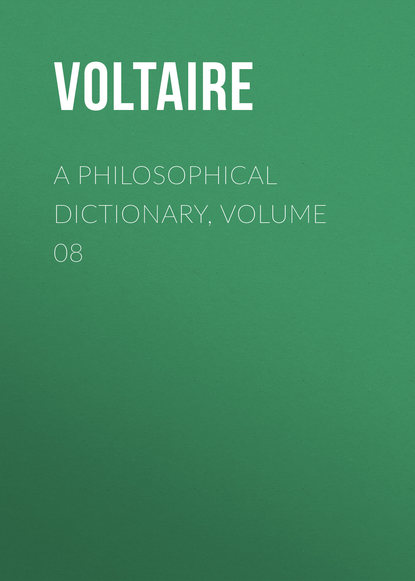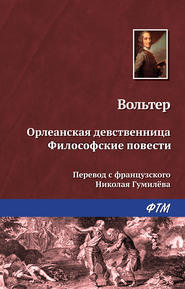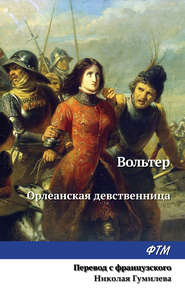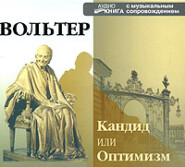По всем вопросам обращайтесь на: info@litportal.ru
(©) 2003-2024.
✖
A Philosophical Dictionary, Volume 08
Настройки чтения
Размер шрифта
Высота строк
Поля
We cannot doubt that there was a Moses, a legislator of the Jews. We will here examine his history, following merely the rules of criticism; the Divine is not submitted to similar examination. We must confine ourselves to the probable; men can only judge as men. It is very natural and very probable that an Arab nation dwelt on the confines of Egypt, on the side of Arabia Deserta; that it was tributary or slave to the Egyptian kings, and that afterwards it sought to establish itself elsewhere; but that which reason alone cannot admit is, that this nation, composed of seventy persons at most in the time of Joseph, increased in two hundred and fifteen years, from Joseph to Moses, to the number of six hundred thousand combatants, according to the Book of Exodus, which six hundred thousand men capable of bearing arms imply a multitude of about two millions, counting old men, women, and children. It is not certainly in the course of nature for a colony of seventy persons, as many males as females, to produce in two centuries two millions of inhabitants. The calculations made on this progression by men very little versed in the things of this world, are falsified by the experience of all nations and all times. Children are not made by a stroke of the pen. Reflect well that at this rate a population of ten thousand persons in two hundred years would produce more inhabitants than the globe of the earth could sustain.
Is it any more probable, that these six hundred thousand combatants, favored by the Author of nature who worked for them so many prodigies, were forced to wander in the deserts in which they died, instead of seeking to possess themselves of fertile Egypt?
By these rules of an established and reasonable human criticism, we must agree that it is very likely that Moses conducted a small people from the confines of Egypt. There was among the Egyptians an ancient tradition, related by Plutarch in his "Treatise on Isis and Osiris," that Tiphon, the father of Jerosselaim and Juddecus, fled from Egypt on an ass. It is clear from this passage that the ancestors of the Jews, the inhabitants of Jerusalem, were supposed to have been fugitives from Egypt. A tradition, no less ancient and more general is, that the Jews were driven from Egypt, either as a troop of unruly brigands, or a people infected with leprosy. This double accusation carries its probability even from the land of Goshen, which they had inhabited, a neighboring land of the vagabond Arabs, and where the disease of leprosy, peculiar to the Arabs, might be common. It appears even by the Scripture that this people went from Egypt against their will. The seventeenth chapter of Deuteronomy forbids kings to think of leading the Jews back to Egypt.
The conformity of several Egyptian and Jewish customs still more strengthens the opinion that this people was an Egyptian colony, and what gives it a new degree of probability is the feast of the Passover; that is to say, of the flight or passage instituted in memory of their evasion. This feast alone would be no proof; for among all peoples there are solemnities established to celebrate fabulous and incredible events; such were most of the feasts of the Greeks and Romans; but a flight from one country to another is nothing uncommon, and calls for belief. The proof drawn from this feast of the Passover receives a still greater force by that of the Tabernacles, in memory of the time in which the Jews inhabited the desert on their departure from Egypt. These similitudes, united with so many others, prove that a colony really went from Egypt, and finally established itself for some time at Palestine.
Almost all the rest is of a kind so marvellous that human sagacity cannot digest it. All that we can do is to seek the time in which the history of this flight – that is to say, the Book of Exodus – can have been written, and to examine the opinions which then prevailed; opinions, of which the proof is in the book itself, compared with the ancient customs of nations.
With regard to the books attributed to Moses, the most common rules of criticism permit us not to believe that he can be the author of them.
1. It is not likely that he spoke of the places by names which were not given to them until long afterwards. In this book mention is made of the cities of Jair, and every one agrees that they were not so named until long after the death of Moses. It also speaks of the country of Dan, and the tribe of Dan had not given its name to the country of which it was not yet the master.
2. How could Moses have quoted the book of the wars of the Lord, when these wars and this book were after his time?
3. How could Moses speak of the pretended defeat of a giant named Og, king of Bashan, vanquished in the desert in the last year of his government? And how could he add, that he further saw his bed of iron of nine cubits long in Rabath? This city of Rabath was the capital of the Ammonites, into whose country the Hebrews had not yet penetrated. Is it not apparent, that such a passage is the production of a posterior writer, which his inadvertence betrays? As an evidence of the victory gained over the giant, he brings forward the bed said to be still at Rabath, forgetting that it is Moses whom he makes speak, who was dead long before.
4. How could Moses have called cities beyond the Jordan, which, with regard to him, were on this side? Is it not palpable, that the book attributed to him was written a long time after the Israelites had crossed this little river Jordan, which they never passed under his conduct?
5. Is it likely that Moses told his people, that in the last year of his government he took, in the little province of Argob – a sterile and frightful country of Arabia Petræa – sixty great towns surrounded with high fortified walls, independent of an infinite number of open cities? Is it not much more probable that these exaggerations were afterwards written by a man who wished to flatter a stupid nation?
6. It is still less likely, that Moses related the miracles with which this history is filled.
It is easy to persuade a happy and victorious people that God has fought for them; but it is not in human nature that a people should believe a hundred miracles in their favor, when all these prodigies ended only in making them perish in a desert. Let us examine some of the miracles related in Exodus.
7. It appears contradictory and injurious to the divine essence to suppose that God, having formed a people to be the sole depository of His laws, and to reign over all nations, should send a man of this people to demand of the king, their oppressor, permission to go into the desert to sacrifice to his God, that this people might escape under the pretence of this sacrifice. Our common ideas cannot forbear attaching an idea of baseness and knavery to this management, far from recognizing the majesty and power of the Supreme Being.
When, immediately after, we read that Moses changed his rod into a serpent, before the king, and turned all the waters of the kingdom into blood; that he caused frogs to be produced which covered the surface of the earth; that he changed all the dust into lice, and filled the air with venomous winged insects; that he afflicted all the men and animals of the country with frightful ulcers; that he called hail, tempests, and thunder, to ruin all the country; that he covered it with locusts; that he plunged it in fearful darkness for three days; that, finally, an exterminating angel struck with death all the first-born of men and animals in Egypt, commencing with the son of the king; again, when we afterwards see his people walking across the Red Sea, the waves suspended in mountains to the right and left, and later falling on the army of Pharaoh, which they swallowed up – when, I say, we read all these miracles, the first idea which comes into our minds is, that this people, for whom God performed such astonishing things, no doubt became the masters of the universe. But, no! the fruit of so many wonders was, that they suffered want and hunger in arid sands; and – prodigy upon prodigy – all died without seeing the little corner of earth in which their descendants afterwards, for some years, established themselves! It is no doubt pardonable if we disbelieve this crowd of prodigies, at the least of which reason so decidedly revolts.
This reason, left to itself, cannot be persuaded that Moses wrote such strange things. How can we make a generation believe so many miracles uselessly wrought for it, and all of which, it is said, were performed in the desert? What being, enjoying divine power, would employ it in preserving the clothes and shoes of these people, after having armed all nature in their favor?
It is therefore very natural to think that all this prodigious history was written a long time after Moses, as the romances of Charlemagne were forged three centuries after him; and as the origins of all nations have not been written until they were out of sight, the imagination has been left at liberty to invent. The more coarse and unfortunate a people are, the more they seek to exalt their ancient history; and what people have been longer miserable, or more barbarous, than the Jews?
It is not to be believed that, when they had not wherewithal to make shoes in their deserts, under the government of Moses, there were any cunning enough to write. We should presume, that the poor creatures born in these deserts did not receive a very brilliant education; and that the nation only began to read and write when it had some commerce with Phœnicia. It was probably in the commencement of monarchy that the Jews, feeling they had some genius, wrote the Pentateuch, and adjusted their traditions. Would they have made Moses recommend kings to read and write his law in a time in which there were no kings? Is it not probable, that the seventeenth chapter of Deuteronomy was composed to moderate the power of royalty; and that it was written by priests in the time of Saul?
It is most likely at this epoch that we must place the digest of the Pentateuch. The frequent slaveries to which this people were subject seem badly calculated to establish literature in a nation, and to render books very common; and the more rare these books were in the commencement, the more the authors ventured to fill them with miracles.
The Pentateuch, attributed to Moses, is, no doubt, very ancient; if it was put in order in the time of Saul and Solomon, it was about the time of the Trojan war, and is one of the most curious monuments of the manner of thinking of that time. We see that all known nations, in proportion to their ignorance, were fond of prodigies. All was then performed by celestial ministry in Egypt, Phrygia, Greece, and Asia.
The authors of the Pentateuch give us to understand that every nation has its gods, and that these gods have all nearly an equal power.
If Moses, in the name of God, changed his rod into a serpent, the priests of Pharaoh did as much; if he changed all the waters of Egypt into blood, even to that which was in the vases, the priests immediately performed the same prodigy, without our being able to conceive on what waters they performed this metamorphosis; at least, unless they expressly created new waters for the purpose. The Jewish writers prefer being reduced to this absurdity, rather than allow us to suspect that the gods of Egypt had not the power of changing water into blood as well as the God of Jacob.
But when the latter fills the land of Egypt with lice, changing all the dust into them, His entire superiority appears; the magi cannot imitate it, and they make the God of the Jews speak thus: "Pharaoh shall know that nothing is equal to me." These words put into his mouth, merely mark a being who believes himself more powerful than his rivals; he was equalled in the metamorphosis of a rod into a serpent, and in that of the waters into blood; but he gains the victory in the article of the lice and the following miracles.
This idea of the supernatural power of priests of all countries is displayed in several places of Scripture. When Balaam, the priest of the little state of a petty king, named Balak, in the midst of deserts, is near cursing the Jews, their God appears to him to prevent him. It seems that the malediction of Balaam was much to be feared. To restrain this priest, it is not enough that God speaks to him, he sends before him an angel with a sword, and speaks Himself again by the mouth of his ass. All these precautions certainly prove the opinion which then prevailed, that the malediction of a priest, whatever it was, drew fatal consequences after it.
This idea of a God superior to other gods, though He made heaven and earth, was so rooted in all minds, that Solomon in his last prayer cries: "Oh, my God! there is no other god like thee in earth or heaven." It is this opinion which rendered the Jews so credulous respecting the sorceries and enchantments of other nations.
It is this which gave rise to the story of the Witch of Endor, who had the power of invoking the shade of Saul. Every people had their prodigies and oracles, and it never even came into the minds of any nations to doubt the miracles and prophecies of others. They were contented with opposing similar arms; it seems as if the priests, in denying the prodigies of other nations, feared to discredit their own. This kind of theology prevailed a long time over all the earth.
It is not for us to enter here on the detail of all that is written on Moses. We speak of his laws in more than one place in this work. We will here confine ourselves to remarking how much we are astonished to see a legislator inspired by God; a prophet, through whom God Himself speaks, proposing to us no future life. There is not a single word in Leviticus, which can lead us to suspect the immortality of the soul. The reply to this overwhelming difficulty is, that God proportioned Himself to the ignorance of the Jews. What a miserable answer! It was for God to elevate the Jews to necessary knowledge – not to lower Himself to them. If the soul is immortal, if there are rewards and punishments in another life, it is necessary for men to be informed of it. If God spoke, He must have informed them of this fundamental dogma. What legislator, what god but this, proposes to his people wine, oil, and milk alone! What god but this always encourages his believers, as a chief of robbers encourages his troops, with the hope of plunder only! Once more; it is very pardonable for mere human reason simply to see, in such a history, the barbarous stupidity of the first ages of a savage people. Man, whatever he does, cannot reason otherwise; but if God really is the author of the Pentateuch, we must submit without reasoning.
MOTION
A philosopher, in the neighborhood of Mount Krapak, argued with me that motion is essential to matter.
"Everything moves," says he; "the sun continually revolves on its own axis; the planets do the same, and every planet has many different motions; everything is a sieve; everything passes through a sieve; the hardest metal is pierced with an infinity of pores, by which escapes a constant torrent of vapors that circulate in space. The universe is nothing but motion; motion, therefore, is essential to matter."
"But, sir," said I to him, "might not any one say, in answer to what you have advanced: This block of marble, this cannon, this house, this motion, are not in motion; therefore motion is not essential?"
"They do move," he replied; "they move in space together with the earth by the common motion, and they move so incontestably – although insensibly – by their own peculiar motion, that, at the expiration of an indefinite number of centuries, there will remain not a single atom of the masses which now constitute them, from which particles are detaching themselves every passing moment."
"But, my good sir, I can conceive matter to be in a state of rest; motion, therefore, cannot be considered essential to it."
"Why, certainly, it must be of vast consequence whether you conceive it to be, or conceive it not to be, in a state of rest. I still repeat, that it is impossible for it to be so."
"This is a bold assertion; but what, let me ask you, will you say to chaos?"
"Oh, chaos! If we were inclined to talk about chaos, I should tell you that all was necessarily in motion, and that 'the breath of God moved upon the waters'; that the element of water was recognized in existence, and that the other elements existed also; that, consequently, fire existed; that there cannot be fire without motion, that motion is essential to fire. You will not succeed much with chaos."
"Alas! who can succeed with all these subjects of dispute? But, as you are so very fully acquainted with these things, I must request you to inform me why one body impels another: whether it is because matter is impenetrable, or because two bodies cannot be together in one place; or because, in every case of every description, the weak is driven before the strong?"
"Your last reason is rather more facetious than philosophical. No person has hitherto been able to discover the cause of the communication of motion."
"That, however, does not prevent its being essential to matter. No one has ever been able to discover the cause of sensation in animals; yet this sensation is so essential to them, that, if you exclude the idea of it, you no longer have the idea of an animal."
"Well, I will concede to you, for a moment, that motion is essential to matter – just for a moment, let it be remembered, for I am not much inclined to embroil myself with the theologians – and now, after this admission, tell me how one ball produces motion in another?"
"You are very curious and inquisitive; you wish me to inform you of what no philosopher ever knew."
"It appears rather curious, and even ludicrous, that we should know the laws of motion, and yet be profoundly ignorant of the principle of the communication of motion!"
"It is the same with everything else; we know the laws of reasoning, but we know not what it is in us that reasons. The ducts through which our blood and other animal fluids pass are very well known to us, but we know not what forms that blood and those fluids. We are in life, but we know not in what the vital principle consists."
"Inform me, however, at least, whether, if motion be essential to matter, there has not always existed the same quantity of motion in the world?"
"That is an old chimera of Epicurus revived by Descartes. I do not, for my own part, see that this equality of motion in the world is more necessary than an equality of triangles. It is essential that a triangle should have three angles and three sides, but it is not essential that the number of triangles on this globe should be always equal."
"But is there not always an equality of forces, as other philosophers express it?"
"That is a similar chimera. We must, upon such a principle, suppose that there is always an equal number of men, and animals, and moving beings, which is absurd."
By the way, what, let me ask, is the force of a body in motion? It is the product of its quantity multiplied by its velocity in a given time. Calling the quantity of a body four, and its velocity four, the force of its impulse will be equal to sixteen. Another quantity we will assume to be two, and its velocity two; the force with which that impels is as four. This is the grand principle of mechanics. Leibnitz decidedly and pompously pronounced the principle defective. He maintained that it was necessary to measure that force, that product, by the quantity multiplied by the square of the velocity. But this was mere captious sophistry and chicanery, an ambiguity unworthy of a philosopher, founded on an abuse of the discovery of the great Galileo, that the spaces traversed with a motion uniformly accelerated were, to each other, as the squares of the times and velocities.
Leibnitz did not consider the time which he should have considered. No English mathematician adopted his system. It was received for a while by a small number of geometricians in France. It pervaded some books, and even the philosophical institutions of a person of great celebrity. Maupertuis is very abusive of Mairan, in a little work entitled "A, B, C"; as if he thought it necessary to teach the a, b, c, of science to any man who followed the old and, in fact, the true system of calculation. Mairan was, however, in the right. He adhered to the ancient measurement, that of the quantity multiplied by the velocity. He gradually prevailed over his antagonists, and his system recovered its former station; the scandal of mathematics disappeared, and the quackery of the square of the velocity was dismissed at last to the extramundane spaces, to the limbo of vanity, together with the monads which Leibnitz supposed to constitute the concentric mirror of nature, and also with his elaborate and fanciful system of "pre-established harmony."
MOUNTAIN















